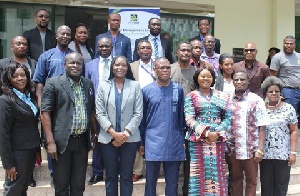 CEO, West Blue, Members of the Parliamentary Select Committee on Trade, Industry and Tourism
CEO, West Blue, Members of the Parliamentary Select Committee on Trade, Industry and Tourism
Members of the Parliamentary Select Committee on Trade, Industry and Tourism have lauded West blue consulting on spearheading the implementation of the Ghana National Single Window (GNSW) project at the country’s port.
According to Committee chair, Titus Glover, Member of Parliament for Tema East, the novelty project which aims among others things at reducing delays at the ports has been considerable successful.
The purpose of the visit was to abreast themselves with the operations of the company after its successful implementation of the Pre-Arrival Assessment Reporting System (PAARS) and the Ghana National Single Window Project (GNSW).
The PAARS is a modernized system that has been developed by the Customs Division of Ghana Revenue Authority (GRA) as part of the implementation of the GNSW project to enhance revenue mobilization, improve border security and customs clearance, overcome duplication across regulatory agencies and promote trade facilitation.
Speaking at the meeting, Former Minister of Transport, Fiifi Fiave kwertey, a Member of the Committee and Member of Parliament for Ketu South, urged West Blue to roll out more measures to increase government revenue at the ports.
The Chairman of the Parliamentary Select Committee on Trade, Industry and Tourism, Titus Glover said the committee was impressed with the level of work done by West Blue in the implementation of the GNSW.
Earlier, presenting an overview of the GNSW, Madam Mintah added that the first phase of the GNSW project, the PAARS began in September 2015, while additional elements including the tariff calculator are also in operations.
The Customs Division of GRA took over the processing of the CCRV from the destination companies in September 2015. The CCRV replaced the destination inspection report also known as the Final Classification and Valuation Report (FCVR). In spite of the successes chalked so far through the implementation of the PAARS, she said there was still more room for improvement.
Economic benefits of GNSW
This, Madam Mintah explained have had a huge impact on the international competitiveness of Ghanaian business and should other things being equal, result in a strong growth in the country’s international trade performance.
It has also significantly increase the global ranking of Ghana in the World Bank’s ‘Trading across Borders Report’. Similarly, Ghana is the ranked among the first 10 countries within the Sub-Saharan African regions could increase.
Madam Mintah added that another potential benefit of the GNSW is the likely positive impact on the country’s foreign direct investment prospects.
“Trade efficiency is a key determinant of investment decisions by international business and the positioning of Ghana as a trade efficient and trade friendly country will greatly enhance its attractiveness to such investors”.
Furthermore, she believes that the GNSW will continue to boost economic growth of the country, adding that the Single Window would enhance institutional and nation building, improved and effective collection of government revenues, simpler, faster processes for clearance and release, reduced costs of compliance, reduced corruption, reduction in bureaucratic processes, among others.
Background
Instructively, the GNSW project was initiated on 1st September 2015 by the Government of Ghana to enhance the country’s trade and economic development and secure and increase government revenue. It was officially launched in 1st December, 2015.
Indeed, the Single Window concept was developed by the United Nations Economic Commission for Europe (UNECE) in 2005 as an effort to simplify, harmonise and standardise international trade procedures and associated information flows between trade and government and within government itself.
UNECE, through its UN Centre for Trade Facilitation and Electronic Business (UN/CEFACT), defined Single Window as “a facility that allows parties involved in trade and transport to lodge standardised information and documents with a single entry point to fulfil all import, export, and transit-related regulatory requirements. If information is electronic, then individual data elements should only be submitted once”.